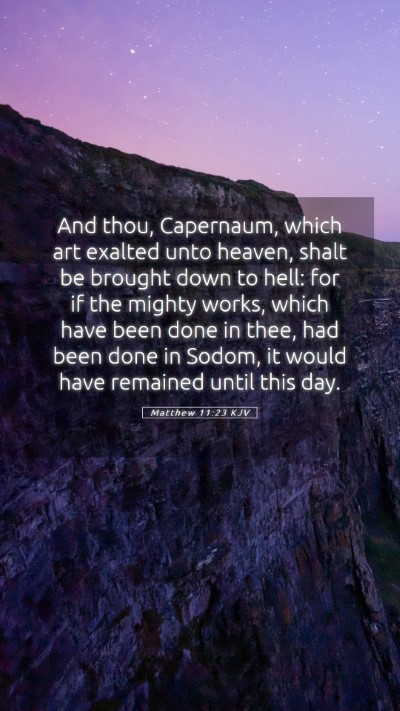Understanding Matthew 11:23
Verse: "And thou, Capernaum, which art exalted unto heaven, shalt be brought down to hell: for if the mighty works, which have been done in thee, had been done in Sodom, it would have remained until this day." (Matthew 11:23)
Overview
This verse serves as a solemn warning to Capernaum, a city that had witnessed the miracles of Jesus yet remained unrepentant. It articulates a significant theme found throughout Scripture regarding accountability in light of divine revelation. The intent is to underscore the severity of rejecting God's grace after witnessing His power and authority.
Bible Verse Commentary
- Matthew Henry’s Commentary:
Henry emphasizes that Capernaum was favored with Christ’s presence and miracles, making their eventual downfall more tragic. The comparison to Sodom highlights the idea that those who have greater spiritual light are held to greater accountability.
- Albert Barnes’ Notes:
Barnes suggests that the reference to Sodom serves as a rhetorical device, reminding the readers that even cities known for their wickedness could have repented had they received the same opportunities as Capernaum. The essence of the message is about the richness of grace offered and the grave consequences of its rejection.
- Adam Clarke’s Commentary:
Clarke dives into the geographical significance and the historical fate of Capernaum while stressing the moral implications of Jesus’ message. His exposition urges readers to reflect on the extent of their spiritual responsibilities, echoing the sentiment that unrepentant cities faced dire outcomes.
Key Themes
- Accountability: This verse calls attention to how much is given to those who have received revelations of God, thus increasing their accountability.
- Divine Justice: The reference to Sodom emphasizes that God’s judgment will be severe for those who reject clear signs of His presence.
- Repentance and Grace: The verse illustrates the opportunity for repentance as a core aspect of Jesus’ ministry.
In-Depth Bible Verse Analysis
By examining Matthew 11:23, we gain insight into the historical context of Capernaum, which was not only a hub for Jesus’ ministry but also a place of stark choices. Understanding the fate of cities that reject God can lead to a deeper appreciation of divine mercy and judgment.
Historical Context of Bible Verses
Understanding the ancient Jewish understanding of cities like Capernaum and Sodom, both known for their spiritual significance and failure to adhere to God’s commandments, adds depth to this passage. The historical context allows us to grasp why Jesus chose such a stark comparison.
Application in Daily Life
This passage invites believers today to reflect on their responses to divine callings and the miracles they may witness in their lives. It encourages individuals to evaluate their spiritual lives and recognize the importance of repentance and acknowledgment of Christ’s work.
Cross References
- Luke 10:15 - Further admonishes Capernaum.
- Ezekiel 16:49-50 - Describes the sins of Sodom.
- John 15:22 - States the responsibility of those who hear Jesus’ words.
Conclusion
Matthew 11:23 is a stark reminder of the implications of witnessing God’s work and the seriousness of rejecting it. This scripture provides rich ground for exploration in Bible study groups or personal reflection, offering substantial insights for those pursuing deeper Biblical understanding.
Further Study
For those engaged in online Bible study or utilizing Bible study tools, this verse can encourage discussions about Bible study topics focused on accountability and grace. Utilizing Bible study guides that explore prophetic interpretations can also enhance understanding.


